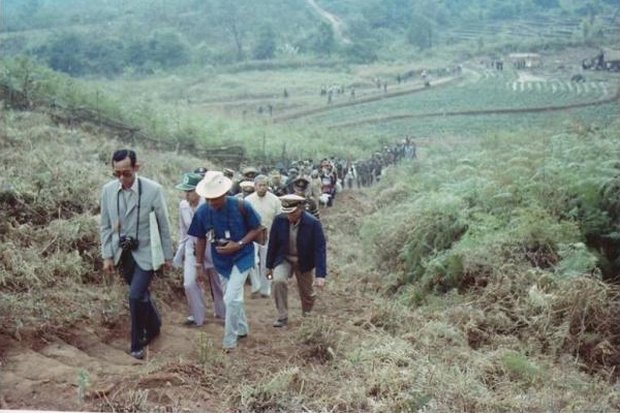
Today marks the beginning of the royal funeral ceremonies for the late King Bhumibol Adulyadej. For me, this is a time when all Thais form collective memories. For over a year, we have been united in showing our love and respect to the late monarch. We are saddened by his passing, humbled by solemn rituals and will be enthralled by all forms of traditional Thai arts during the royal funeral and cremation ceremonies.
Next week, there will be no mourners in black queuing for long hours under the scorching sun or heavy rain, waiting their turn to enter the Dusit Throne Hall where the late King was laid in state. An army of kind and polite volunteers too will disappear. The royal crematorium will be displayed for a month before being relocated to a museum in Pathum Thani province. Sanam Luang will return to its usual condition of a public ground. Yet I believe every time we pass, all those sad memories will come back.
Yet, I believe the legacy of the late monarch will also remain with us in various ways.
People share their memories and inspiration from the late King. Young children have said they will do good works and follow the late King's examples. Officials vowed they will help poor people while tycoons and businessmen pledged they will practice the sufficiency economy.
There are also tangible legacies the late King has left us -- among them over 4,600 royal projects across the country. Most of these projects are related to environmental conservation and many of them are located in rural areas.
As a journalist covering environmental issues for two decades, I have been inspired by the late King's conservation work and his commitment to environmental protection. The late King has used his royal residences such as Chitralada Palace in Bangkok or Klai Kang Won in Hua Hin for pilot projects on renewable energy, garbage recycling, and organic farming to back up his sufficiency economy theory and apply these projects to rural communities.
He knew the only way to help poor people escape poverty was to provide them with an education, morality and capital -- sustainable water resources, and rich and farmable soil and forests where local villagers and nature can coexist in harmony.
Needless to say, the late King is my all-time favourite conservationist because I admire his approach which respects nature, with people living in harmony with ecology. Many officials who served him, such as the former director-general of the Royal Irrigation Department Pramoj Maiklad, have said the late King studied the backgrounds of communities where he planned to visit, their topography and nature.
With profound knowledge, the late monarch always paid heed to rural people, to come up with solutions that suited local needs and blended with local nature.
For example, he came up with the idea of planting special trees to absorb extra salt in the soil to make it farmable, and in the north he taught local people to build small check-dams in upstream mountains to protect watersheds, and reforest the land to protect the environment, while making a living as well.
The late King taught farmers small-scale integrated farming, so they could shift from mono crops, middle men and massive use of farm chemicals.
For flood management, he encouraged authorities to incorporate nature as an efficient way to deal with water. For example, he advised the Bangkok Metropolitan Administration to revive canals and natural flood catchments as water retention areas to fight against floods.
At this point, I wonder whether we as a country can do half of what the late King had done. Look at the forests, we still witness trees being cleared to accommodate mono crops, and a lot of villagers are evicted from their ancestral forest land.
In Bangkok and in urban areas, canals and natural waterways and ponds are filled in for land development. We keep dumping garbage in forests, in rivers and seas without thinking that it's these natural resources that the late King had worked so hard to protect.
After shedding our tears, we need to move on and face new challenges: showing our love towards him by doing what he taught us.
Many of us may plant trees, while others may try to practice his sufficiency theory. Whatever we do, never forget the passion of King Bhumibol on environmental conservation and how much he has done to protect it. Always remember: No one in this land can love forests, rivers and the soil the way he did.
